
Boletin de Geologia
Scope & Guideline
Fostering Collaboration in the Heart of Geology.
Introduction
Aims and Scopes
- Geological Characterization and Analysis:
The journal emphasizes the detailed characterization of geological formations, including studies on mineralogy, petrology, and geochemistry. This includes analysis of rock formations, sedimentary processes, and the chemical properties of minerals. - Geophysical and Geochemical Investigations:
Research methodologies often include geophysical techniques such as seismic modeling, magnetometry, and electrical resistivity studies. Geochemical assessments of soil, water, and minerals are also a significant focus, providing insights into natural resource potential and environmental impact. - Hydrocarbon Exploration and Evaluation:
A prominent area of study involves the assessment of hydrocarbon systems, including the evaluation of oil and gas reservoirs, and methodologies for understanding hydrocarbon entrapment and migration. - Paleoclimatic and Paleoenvironmental Studies:
The journal publishes research related to paleoclimate reconstructions and the analysis of geological records, which are vital for understanding historical environmental changes and their implications. - Geohazards and Environmental Geology:
Research on landslides, seismicity, and other geohazards is common, with a focus on risk assessment and mitigation strategies relevant to local populations. - Geological History and Tectonics:
The journal documents tectonic evolution and geological history, particularly within the context of the Andes and other significant geological structures in Latin America.
Trending and Emerging
- Climate Change and Environmental Impact Assessments:
There is a growing focus on studies that assess the geological impacts of climate change, including those related to groundwater resources and sedimentary processes, indicating an increasing awareness of environmental issues. - Advanced Geophysical Techniques:
The use of innovative geophysical methods, such as deep learning in gravimetry and magnetometry, is on the rise. This trend demonstrates a shift towards integrating technology and data science into geological research. - Geothermal Energy Studies:
Emerging research on geothermal systems and energy potential reflects the global shift towards renewable energy sources, with studies focusing on geothermal resource characterization in volcanic regions. - Geochemical Exploration for Rare Elements:
An increased emphasis on the geochemical characterization of rare and critical minerals, such as lithium and uranium, aligns with global demand for these resources in technology and energy sectors. - Community and Ecosystem-Based Geological Studies:
Research addressing geological features in relation to ecosystem management and community protection is gaining traction, reflecting a holistic approach to geology and environmental stewardship.
Declining or Waning
- Paleontological Studies:
Research focusing on paleontology, including fossil studies and their implications for geological history, has decreased. This may indicate a shift towards more applied geological research or environmental studies. - Mineral Resource Management:
There appears to be a waning interest in broader discussions around mineral resource management and sustainable practices in mining, as more specific studies on mineralogy and geochemistry take precedence. - Sedimentology and Stratigraphy:
Although still relevant, there is less emphasis on broad sedimentological and stratigraphic studies, possibly due to a focus on more specific geological phenomena or resource-related investigations.
Similar Journals
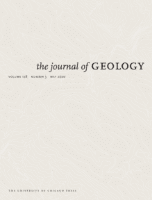
JOURNAL OF GEOLOGY
Illuminating the Path of Geological Discovery.The JOURNAL OF GEOLOGY, published by University of Chicago Press, serves as a premier platform for disseminating groundbreaking research in the field of geology. Established in 1973, this esteemed journal has consistently ranked in the Q2 category in geology, further solidified by its Scopus ranking, where it is positioned at 99 out of 321 in Earth and Planetary Sciences, marking it in the 69th percentile of its category. With an emphasis on innovative and interdisciplinary studies, the journal features peer-reviewed articles that contribute to the understanding of geological processes, earth materials, and environmental interactions. Although it does not currently offer open access, it facilitates broad access through academic institutions to reach a global audience of researchers, professionals, and students striving to advance the knowledge of Earth's history and dynamics. As a vital resource for the geology community, the JOURNAL OF GEOLOGY plays an essential role in fostering scholarly dialogue and advancing both academic inquiry and practical applications in geology.
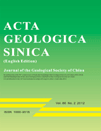
ACTA GEOLOGICA SINICA-ENGLISH EDITION
Unveiling Insights in Geology Since 1988ACTA GEOLOGICA SINICA-ENGLISH EDITION is a distinguished academic journal published by Wiley, providing a platform for cutting-edge research in the field of geology. With an ISSN of 1000-9515 and E-ISSN 1755-6724, this journal has been a pivotal resource since its inception in 1988, catering to scholars and professionals until 2024. The journal is recognized for its high-quality articles, achieving a Q2 ranking in the field of Geology according to the 2023 category quartiles, and ranks #122 out of 321 in the Scopus Earth and Planetary Sciences sector, placing it within the 62nd percentile among its peers. Although currently not available as an open access publication, it remains a significant repository of knowledge that supports ongoing geological research and exploration. For researchers, students, and professionals looking to deepen their understanding of geological sciences, ACTA GEOLOGICA SINICA-ENGLISH EDITION stands as an essential journal, promoting collaboration and innovation in the earth sciences.
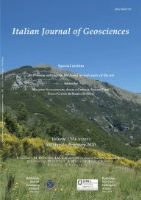
Italian Journal of Geosciences
Unlocking Planetary Insights: Where Earth Meets ResearchItalian Journal of Geosciences, published by the Società Geologica Italiana, is a distinguished platform for the dissemination of research in the fields of Earth and Planetary Sciences and Geology. With an impressive impact factor reflected in its 2023 rankings, where it placed in the Q3 category across its related fields, this journal serves as a vital resource for academics, practitioners, and students. Established in 2010 and poised to continue until 2024, the journal showcases critical advancements and interdisciplinary studies that deepen our understanding of geological processes and Earth systems. Operating under open access options, it offers robust accessibility to a broad audience, facilitating wider dissemination of knowledge. The journal's affiliation with Università degli Studi La Sapienza in Rome, Italy, further underscores its commitment to academic excellence and innovation in geosciences.

Boletin de Ciencias de la Tierra
Exploring the Depths of Earth Science InnovationBoletin de Ciencias de la Tierra is a distinguished open-access journal dedicated to the field of Earth and Planetary Sciences, published by the Universidad Nacional de Colombia, Sede Medellín. Since its transition to open access in 2006, it has become an essential platform for disseminating high-quality research that addresses critical geological and environmental issues pertinent to Latin America and beyond. With an ISSN of 0120-3630 and an E-ISSN of 2357-3740, the journal aims to promote scientific dialogue and share innovative findings in various areas including geology, geochemistry, and environmental sciences. Although it currently holds a Scopus rank of #184 in the General Earth and Planetary Sciences category, indicating a percentile of only 5, Boletin de Ciencias de la Tierra is committed to fostering a rich academic discourse and enhancing the visibility of scholarly works. Situated in Medellín, Colombia, the journal serves as a vital resource for researchers, professionals, and students looking to explore advancements and participate in the global conversation on Earth sciences.
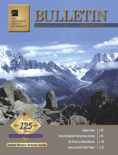
GEOLOGICAL SOCIETY OF AMERICA BULLETIN
Innovative Research Shaping the Geosciences LandscapeThe Geological Society of America Bulletin (GSA Bulletin), with ISSN 0016-7606 and E-ISSN 1943-2674, is a premier scholarly journal published by Geological Society of America, Inc. Based in the United States, this journal has been a cornerstone of geological research since its inception in 1890, making significant contributions to the understanding of Earth sciences over more than a century. Recognized for its rigorous peer-review process, the GSA Bulletin currently holds a prestigious Q1 ranking in Geology, positioning it among the top 14 journals in Earth and Planetary Sciences in terms of Scopus ranking, reflecting the high quality and impact of the research it publishes. Researchers, professionals, and students alike benefit from its comprehensive coverage of geological topics, including sedimentology, volcanology, and paleontology, which supports the advancement of knowledge in the geosciences. While the journal is not open access, it continues to provide a vital platform for innovative research and critical discussions that shape the future of geology.
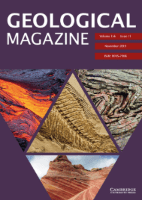
GEOLOGICAL MAGAZINE
Advancing Earth Sciences Since 1864GEOLOGICAL MAGAZINE, published by Cambridge University Press, is a premier journal in the field of geology, renowned for its rich legacy since 1864 and ongoing contributions to Earth and Planetary Sciences. With an impressive Q1 ranking in Geology and a Scopus rank of #70 out of 321 journals, it holds a significant position within the academic community, appealing to researchers, professionals, and students alike. The journal covers a wide array of topics, ensuring a comprehensive platform for the dissemination of cutting-edge geological research. Although it does not offer open access, it remains a vital resource for those seeking to stay abreast of advancements in the field. With an enduring commitment to quality, GEOLOGICAL MAGAZINE stands as an essential outlet for scholarly communication and serves as a catalyst for academic discourse within the geological sciences.

Journal of Geosciences
Connecting Researchers for a Sustainable Future in GeosciencesJournal of Geosciences is a distinguished peer-reviewed journal published by CESKA GEOLOGICKA SPOLECNOST, based in the Czech Republic, that serves as a vital platform for the dissemination of innovative research in the field of Earth and Planetary Sciences. With an ISSN of 1802-6222 and E-ISSN of 1803-1943, this journal has established its significance within the academic community, evidenced by its Q3 ranking in both Earth and Planetary Sciences and Geology. The journal covers a broad array of topics, making it an essential resource for researchers, professionals, and students interested in geoscientific advancements and discoveries. The Journal of Geosciences reflects a commitment to high-quality scholarship, embracing a variety of methodologies and interdisciplinary approaches, and provides open access to its content, thereby encouraging global collaboration and knowledge sharing among geoscientists. With a publication history converging from 2007 to 2024, it continues to be a prominent venue for critical conversations and developments in the ever-evolving field of geosciences.
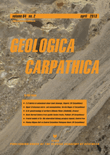
GEOLOGICA CARPATHICA
Exploring the Depths of Earth SciencesGEOLOGICA CARPATHICA, with ISSN 1335-0552 and E-ISSN 1336-8052, is a distinguished open access journal published by the Slovak Academy of Sciences Geological Institute, serving as a pivotal platform for the dissemination of research in the field of Geology. Established in 1991 and continuing through 2024, the journal is recognized for its significant contributions to Earth and Planetary Sciences, evidenced by its 2023 Scopus ranking placing it in the second quartile (Q2) within Geology. With an H-index that showcases its impactful publications, GEOLOGICA CARPATHICA is committed to fostering scholarly communication while promoting accessible research, having adopted an open access model since 2009. Located in beautiful Bratislava, Slovakia, this journal aims to engage a global audience of researchers, professionals, and students interested in ecological, geological, and environmental studies, making it a prominent resource for enriching the scientific community's understanding of the Carpathian region and beyond.

Solid Earth Sciences
Exploring the dynamic processes that shape our planet.Solid Earth Sciences is a dynamic open-access journal published by Elsevier, dedicated to advancing our understanding of the Earth's subsurface processes and materials. Since its inception in 2016, the journal has established itself as a vital resource for researchers and professionals in the fields of geochemistry, petrology, geology, geophysics, and geotechnical engineering, achieving a notable Q2 ranking in multiple categories as of 2023. With an ISSN of 2451-912X, the journal aims to disseminate high-quality research that enhances knowledge of earth surface processes and the intricate interactions within our planet's systems. The journal is indexed in Scopus, showcasing an impressive rank in various sub-disciplines, with a rank of #96 in Geology and a noteworthy percentile in Earth and Planetary Sciences. Solid Earth Sciences offers a platform for innovative studies, comprehensive methodologies, and cutting-edge technological advancements that cater to a global audience of scientists, academics, and students. With its commitment to open access, it fosters wider dissemination and impact of research outcomes, ensuring that pivotal discoveries reach stakeholders and contribute to real-world applications.
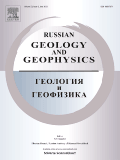
Russian Geology and Geophysics
Elevating Research Standards in Geology and GeophysicsRussian Geology and Geophysics is a seminal journal published by GEOSCIENCEWORLD that plays a pivotal role in the dissemination of vital research within the realms of Earth-Surface Processes, Geology, and Geophysics. With an ISSN of 1068-7971 and an E-ISSN of 1878-030X, this journal has witnessed a continuous evolution since its convergence in 2007 and is poised to thrive through 2024. While it is not an Open Access journal, it is recognized for its significant contributions to the academic community, holding a respectable Q2 ranking in Earth-Surface Processes and Q3 rankings in both Geology and Geophysics as of 2023. The journal’s impact factors align it within competitive quartiles, marking it as an essential resource for researchers and professionals seeking to stay at the forefront of geological and geophysical sciences. By publishing high-quality peer-reviewed articles, the journal fosters an environment of knowledge sharing and innovation, making it indispensable for students, practitioners, and scholars alike who are dedicated to advancing our understanding of Earth's complex systems.